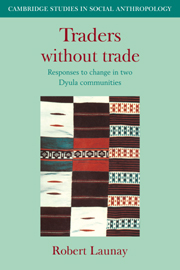Book contents
- Frontmatter
- Contents
- List of figures, maps and tables
- Preface
- 1 Introduction: the people and the problem
- PART I THE LEGACY OF THE PAST
- 2 Dyula and Senufo
- 3 Warriors, scholars and traders
- 4 Clansmen and kinsmen
- 5 The mechanics of marriage
- PART II RESPONSES TO CHANGE
- Notes
- Bibliography
- Index
- Cambridge Studies in Social Anthropology
4 - Clansmen and kinsmen
Published online by Cambridge University Press: 15 October 2009
- Frontmatter
- Contents
- List of figures, maps and tables
- Preface
- 1 Introduction: the people and the problem
- PART I THE LEGACY OF THE PAST
- 2 Dyula and Senufo
- 3 Warriors, scholars and traders
- 4 Clansmen and kinsmen
- 5 The mechanics of marriage
- PART II RESPONSES TO CHANGE
- Notes
- Bibliography
- Index
- Cambridge Studies in Social Anthropology
Summary
The ‘kabila’
Anyone who spends a short time in a Dyula village or quarter cannot fail to notice that it is divided up into kabilas, or descent groups. Cissera (the Cisse quarter), Coulibaly-ra, Bakayoko-ra and so forth exist not only as social units, but as separate residential areas that can be plotted on a map. There are no physical boundaries between these quarters, and one runs right into its neighbor; but generally speaking, each descent group corresponds to a space within the village. A man's occupation, his religious practices, his political allegiance and his relationships with unrelated persons within his own village were all, until relatively recently, affected, though not absolutely determined, by his membership in a given kabila. The kabila dominates the ideology of social relationships among the Dyula; as such, it cannot but have an important, if not always consistent, effect on practice.
The importance which the Dyula accord to the idea of the kabila corresponds to an ideology of patrilineal descent. In principle, the members of a kabila are descended, through the male line, from a single common historical ancestor. There are, however, important exceptions to this general rule. The first exception consists of slaves, and descendants of slaves. Quite obviously, the slaves within a given kabila were not descended from the founding ancestor. Second and subsequent generation slaves (worossos) traced membership in a given kabila not through the male, but through the female, line.
- Type
- Chapter
- Information
- Traders Without TradeResponses to Change in Two Dyula Communities, pp. 48 - 59Publisher: Cambridge University PressPrint publication year: 1982



